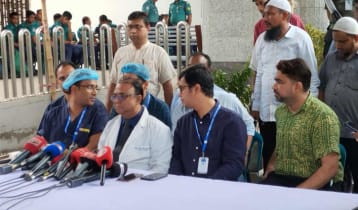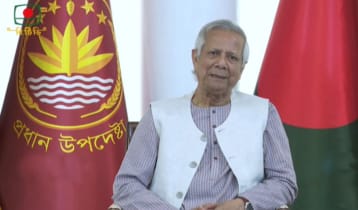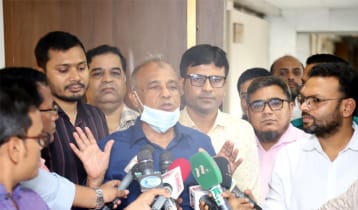Sufia Kamal’s 18th death anniv today
5 || risingbd.com

Staff Correspondent: Today (Monday) is the 18th death anniversary of Poet Sufia Kamal, founding president of Bangladesh Mahila Parishad and a pioneer of Bengali women’s emancipation.
Different social and cultural organisations have chalked out various programmes to observe the day in a befitting manner.
Leaders and activists of Bangabandhu Sangskritik Jote along with noted cultural personalities have paid tributes to the poet by placing floral wreaths at her grave at Azimpur Graveyard in the morning.
A memorial meeting to be organised by Social Protection Committee, a platform consisting of 72 social, human rights and development organisations, will be held at the auditorium of Bangladesh Mahila Parishad at 3:00pm.
Sufia Kamal was born on June 20, 1911 at her maternal uncle’s home at Shayestabad, Barisal. Her father’s name was Abdul Bari and mother was Syeda Sabera Khatun. Despite being born to a conservative Muslim family, she was taught Bengali by her mother Sabera Begum.
Since she belonged to a conservative family at a time when women’s education was prohibited, she was deprived of formal education, but she did learn Bengali, Hindi, English, Urdu, Arabic, Kurdish and Persian languages from house tutors in her childhood.
Sufia’s first poem, Bashanti (Of Spring), was published in Saogat magazine in 1926. Her first collection of poems, Sanjher Maya (Evening Enchantment), was published in 1938 with a foreword by national poet Kazi Nazrul Islam.
Poems of her other collections such as Mrittikar Ghran, Ekatturer Diary, Benibinyas Samay To Ar Nei, and Ekale Amader Kal demonstrate her skill as a romantic and socially conscious poet.
In 1931, she became the first Bengali Muslim woman to be a member of the Indian Women’s Federation.
She edited the women’s magazine Begum before partition of the subcontinent in 1947. She was an excellent organiser. In 1956, she organised the children’s organisation Kochi-Kachar Mela.
Sufia Kamal had been very vocal in national and social issues. She was active in the Language Movement of 1952 and was part of a movement protesting an embargo on Rabindranath Tagore imposed by the government of Pakistan in late 1960s.
She also renounced the Tamgha-I-Imtiaz award given to her by the then Pakistan government. She strongly supported the mass uprising of 1969 and the non-cooperation movement in March 1971. After the independence, she worked for punishment of the war criminals.
Sufia Kamal was also instrumental in naming the first women’s dormitory of Dhaka University as Rokeya Hall after the name of Begum Rokeya, who was her own inspiration.
During the Liberation War in 1971, she worked for helping women who were hurt during the war.
She was awarded the Bangla Academy Award for Literature (1962), Lenin Centenary Jubilee Medal (1970) from the Soviet Union, Ekushey Padak (1976), Czechoslovakia Medal (1986), Jatiya Kabita Parishad Award (1995), Begum Rokeya Medal (1996), Deshbandhu CR Das Gold Medal (1996) and Independence Award (1997) for her works.
Poet Sufia Kamal died on November 20, 1999.
risingbd/Dhaka/Nov 20, 2017/Tipu/AI
risingbd.com


















